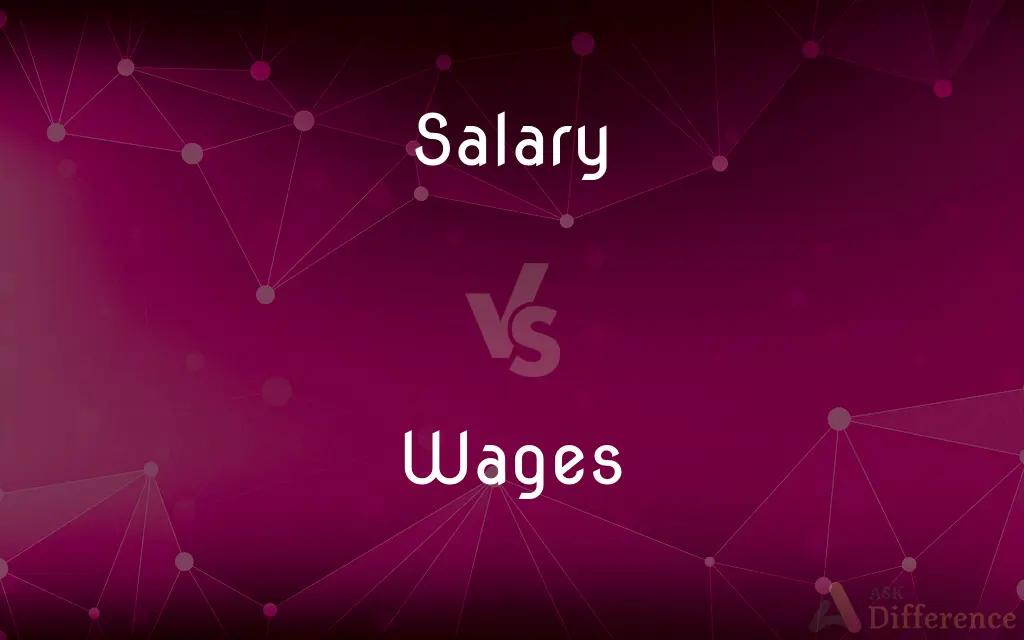Salary vs. Wages — What's the Difference?
Edited by Tayyaba Rehman — By Fiza Rafique — Updated on November 2, 2023
Salary is a fixed regular payment, typically paid on a monthly basis, while wages are paid based on hours worked, often weekly.

Difference Between Salary and Wages
Table of Contents
ADVERTISEMENT
Key Differences
Salary is a fixed amount of money paid to an employee by an employer in return for work performed. Salary is typically paid in consistent installments, either monthly or biweekly, regardless of the number of hours worked. On the other hand, wages refer to remuneration calculated on an hourly, daily, or piecework basis and can fluctuate based on the total hours worked.
A salaried employee often has a contract that includes a set amount paid annually, which is then divided across the pay periods within that year. In contrast, wage earners are paid based on the actual number of hours worked, with overtime pay applicable if they work more than the standard workweek hours.
Salaries are common in professional and white-collar jobs where employees may be expected to complete tasks irrespective of the time it takes to complete them. Wage payments are typical for blue-collar and hourly jobs where the work is more manual and measured by hours on the clock.
Benefits such as paid leave, health insurance, and retirement contributions are often calculated as part of a salary package. Wage earners may not always receive these benefits, and when they do, it’s usually based on the number of hours or days worked.
Salary earners are generally exempt from overtime regulations under the Fair Labor Standards Act (FLSA), whereas wage earners are non-exempt and eligible for overtime pay. Understanding these differences is crucial for both employers in compensating their staff and for employees in negotiating their employment terms.
ADVERTISEMENT
Comparison Chart
Payment Frequency
Monthly or biweekly
Hourly, daily, or weekly
Calculation
Fixed amount
Based on hours worked
Overtime Eligibility
Usually exempt
Usually eligible
Job Types
Professional and white-collar
Blue-collar and hourly jobs
Benefits
Often include benefits
Benefits may vary by hours worked
Compare with Definitions
Salary
Salary is a fixed amount of money or compensation paid to an employee by an employer in return for work performed.
Negotiating his salary was the first thing he did after receiving the job offer.
Wages
Wages are payments made to laborers or workers for their work, typically calculated on an hourly, daily, or weekly basis.
His wages were determined by the number of hours he worked each week.
Salary
Salary is annual income that is usually divided into monthly or biweekly payments.
She receives a good salary for her role as an engineer.
Wages
Wages are the monetary compensation paid by an employer to an employee based on the amount of work done.
The factory pays its workers fair wages for all the hours they put in.
Salary
Salary is the money paid periodically to a person for regular work or services.
They decided to increase her salary due to her outstanding performance.
Wages
Wages are compensation, often financial, paid to a worker for their time and effort.
The construction job paid wages immediately after the work was completed.
Salary
Salary is a regular payment made by an employer to an employee, especially a professional.
Her salary was credited to her account on the first of every month.
Wages
A regular payment, usually on an hourly, daily, or weekly basis, made by an employer to an employee, especially for manual or unskilled work.
Salary
A salary is a form of periodic payment from an employer to an employee, which may be specified in an employment contract. It is contrasted with piece wages, where each job, hour or other unit is paid separately, rather than on a periodic basis.
Wages
Wages The price of labor in an economy.
Salary
A fixed regular payment, typically paid on a monthly basis but often expressed as an annual sum, made by an employer to an employee, especially a professional or white-collar worker
He received a salary of £24,000
A 15 per cent salary increase
Wages
Often wages (used with a sing. or pl. verb) A fitting return; a recompense
The wages of sin.
Salary
Pay a salary to
The Chinese system—salary the doctor and stop his pay when you get ill
Wages
To engage in (a war or campaign, for example).
Salary
Fixed compensation for services, paid to a person on a regular basis.
Wages
Plural of wage. It may take a singular verb. E.g. 'the wages of sin is death' (Romans 6:23 KJV)
Salary
A fixed amount of money paid to a worker, usually calculated on a monthly or annual basis, not hourly, as wages. Implies a degree of professionalism and/or autonomy.
Wages
One's total income for a time period
Salary
To pay on the basis of a period of a week or longer, especially to convert from another form of compensation.
Wages
The share of the annual product or national dividend which goes as a reward to labor, as distinct from the remuneration received by capital in its various forms. This economic or technical sense of the word wages is broader than the current sense, and includes not only amounts actually paid to laborers, but the remuneration obtained by those who sell the products of their own work, and the wages of superintendence or management, which are earned by skill in directing the work of others.
Salary
(obsolete) Saline.
Wages
A recompense for worthy acts or retribution for wrongdoing;
The wages of sin is death
Virtue is its own reward
Salary
Saline
Wages
Wages are a variable amount of money earned that depends on the amount of time worked.
She picked up extra shifts to increase her wages this month.
Salary
The recompense or consideration paid, or stipulated to be paid, to a person at regular intervals for services; fixed wages, as by the year, quarter, or month; stipend; hire.
This is hire and salary, not revenge.
Wages
Wages refer to the hourly or daily payment for work done or services provided.
Overtime work is often paid at a higher rate than regular wages.
Salary
To pay, or agree to pay, a salary to; to attach salary to; as, to salary a clerk; to salary a position.
Salary
Something that remunerates;
Wages were paid by check
He wasted his pay on drink
They saved a quarter of all their earnings
Salary
Salary refers to the wages paid to a white-collar worker, usually on a monthly basis.
His salary includes bonuses and health insurance benefits.
Common Curiosities
Are people who earn wages eligible for benefits?
Wage earners may receive benefits, but this can vary widely and is often based on full-time status or hours worked.
Are wages only for manual labor jobs?
Wages are common for hourly or manual labor jobs but can apply to other types of work as well.
Can salaried employees have flexible work hours?
Salaried positions may offer flexible work hours, depending on the company policy and job requirements.
Is there a minimum wage for salaried employees?
Salaried employees must meet a minimum salary threshold, which the FLSA periodically updates.
Is overtime pay included in a salary?
Typically, salaried positions do not receive overtime pay, as they are exempt from FLSA regulations.
Can a salary be negotiated?
Yes, salaries are often negotiable based on experience, skills, and industry standards.
Do wages include tips?
Wages can include tips, particularly in service jobs, but this varies by employer and can be in addition to base hourly pay.
What determines the amount of a salary?
A salary is typically determined by the position’s requirements, industry standards, qualifications, and experience.
Is salary always paid annually?
Salary is an annual amount divided into smaller payments, typically monthly or biweekly.
Do wage earners get paid during vacations?
Wage earners typically do not get paid for vacations unless they have accrued paid time off or it's provided by employer policy.
Can an employee receive both a salary and wages?
Yes, an individual could receive both if they are engaged in different jobs or roles with different payment structures.
How are salaries and wages taxed?
Both salaries and wages are subject to income tax withholding based on the amount earned and the tax bracket.
Are wages protected by labor laws?
Yes, wages are protected by various labor laws, including minimum wage laws and overtime pay requirements.
Does a salary change based on hours worked?
No, a salary is a fixed amount regardless of the actual hours worked, except in cases of deductions for unpaid leave.
Can wage rates vary from week to week?
Yes, wage rates can vary if they are influenced by commissions or varying hours worked each week.
Share Your Discovery

Previous Comparison
Differential vs. Derivative
Next Comparison
Indecisive vs. UndecidedAuthor Spotlight
Written by
Fiza RafiqueFiza Rafique is a skilled content writer at AskDifference.com, where she meticulously refines and enhances written pieces. Drawing from her vast editorial expertise, Fiza ensures clarity, accuracy, and precision in every article. Passionate about language, she continually seeks to elevate the quality of content for readers worldwide.
Edited by
Tayyaba RehmanTayyaba Rehman is a distinguished writer, currently serving as a primary contributor to askdifference.com. As a researcher in semantics and etymology, Tayyaba's passion for the complexity of languages and their distinctions has found a perfect home on the platform. Tayyaba delves into the intricacies of language, distinguishing between commonly confused words and phrases, thereby providing clarity for readers worldwide.















































